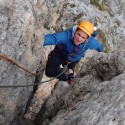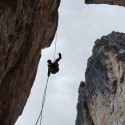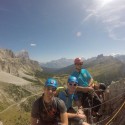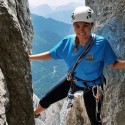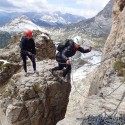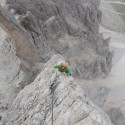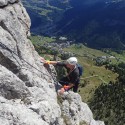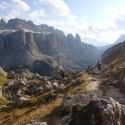As part of its role Exeter UOTC is tasked with organising high quality and demanding Adventurous Training (AT) for the Cadets. This should deliver foundation qualifications but also give the Cadets exposure to just how demanding AT can be and how it can be used to develop personal qualities and teamwork.
The Dolomite mountains of northern Italy are ideal for this. They are quite close but with their huge rock faces and high level trekking routes offer genuinely challenging training. So for these reasons Exeter UOTC mounted an expedition there. This was the fourth year running the UOTC has mounted an expedition to the Dolomites and the third year running it has followed this format. This is because it has been so successful. The idea was to take 32 Cadets for two weeks and stretch them with a demanding programme of activities. To do this requires putting together sufficient highly qualified instructors. The UOTC managed to secure the services of 9 instructors, all well qualified and several with previous Dolomites experience. In addition two of the Cadets who attended the expedition last year have now progressed to earn their basic instructor qualifications and were able to help with the instructing. , The party was completed with the addition of 2 chefs and a admin SNCO. Having chefs was very beneficial, having meals prepared makes for very efficient use of training time and having 32 Cadets det cooking would have very hard to keep control of. Also to undertake demanding long days for two weeks requires everyone to be well fed. The group of students this year consist mainly of first year Cadets, but also a couple of the Cadets who attended last year and have now been commissioned.
The advance party left Wyvern Barracks on the 23th of August and after an overnight stop in the Mosel arrived in Cortina late on the 25th of August. The following morning was spent setting up the camp ready for the arrival of the Cadets and then the Instructors in the Advance Party were free to start recceing routes. This two and a half days of recce time was invaluable. Even for experienced instructors the Dolomites can feel very “out there” so giving people chance to get orientated before they begin instructing allows the expedition to get off to a flying start. Also building on the experience of last year it was possible to recce some much more demanding via ferrata routes and confirm that these were suitable for the Cadets. This included trying out the Tomescelli Via Ferrata. This is long and demanding so had to be recced before taking students.
The main body arrived late on the 27th of August and the party was then complete in Cortina with 31 very excited Cadets keen to get going. The weather forecast was looking good for the first four days but then possible deteriorating so we went straight into full days to take advantage of the weather window.
The Cadets were divided into two groups depending on the preference the expressed, either mountaineering or climbing. Thereafter the two groups operated largely independently and so their activities will be described separately.
Mountaineering Week 1
The mountaineering students were split into two groups and allocated an instructor that they would stay with for the two weeks. The first day was a shake out trek but this was cut out to make the best use of the weather window. Each group spent two days doing the technical aspects of the Summer Mountaineering Foundation course and the other two days doing Via Ferrata. Via Ferrata allows non climbers to get into really exposed and exciting situations. Particularly for those with a fear of heights this added some real excitement to the week. All students did two quality Via Ferrata routes. These are long and demanding days but were very popular with the Cadets. With a better weather forecast than last year and with a bit more local knowledge it was possible to do more demanding routes, the pick of these probably being Punta Anna, with both groups did. The Tomascelli Via Ferrata was a real highlight for the stronger students.
Climbing Week 1
One the first day the climbers were split into two groups. Those that had not climbed before went to a single pitch crag and covered the basics. Those with some experience went to an area called Cinque Torre and revised their single and multi pitch climbing skills. For the next four days two of the climbing instructors were attached to the mountaineers to run the Via Ferrata package. So for this period the climbers concentrated on getting all climbers up to the standard where they could safely climb on big mountain routes ready for week 2. This included all Cadets doing some multi pitch climbing, many of these climbs involved exciting free hanging fifty meter abseils.
Also in this period all students were given the opportunity to try leading on well bolted routes. The students found getting on the “sharp end” of a rope a real challenge. Some took to it like ducks to water, others were a bit more hesitant but all enjoyed controlling their fear and topping out.
First World War Battlefield
All members of the Expedition too the opportunity to visit the excellent First World War museum in the Falzarego pass. This gave a flavour of the unbelievable harsh conditions faced by the soldiers on both sides. Also one of the via ferrata routes (Tuppen Alpini on the Col be Bois Pyramid) was extended to allow the group to descend through the tunnels carved out in WW1. These have been turned into a type of museum with signs in English explaining aspects of the campaign, this was very popular with the Cadets.
First Friday
The Cadets had an excellent visit to Venice, a truly spectacular location, particularly as most Cadets had not been to Venice before. The weather in the Dolomites was continual rain so the instructors went to an indoor climbing wall.
Middle Saturday
The students were given a choice of activities with groups doing trekking via ferrata single pitch and multi pitch climbing.
Middle Sunday
This day was used to move campsites to Canazei. This gives access to a whole new area and particularly for the climbers gives access to a wide range of truly impressive route. tTams of instructors and Cadets grabbed a half day of activities after tge camp was re-established.
Mountaineering Week 2
The focus of this week was for each group to do a three day trek round the Marmolada massive, staying 2 nights in mountain huts. The remaining time was spent doing day treks to deliver the remaining parts of the Syllabus. The three day trek was a real highlight taking in some spectacular scenery and staying in remote huts. The mountaineers also took the chance to get the cable car to near the top of Marmolada and view the glacier on its north face and visit the amazing WW1 museum. Parts of the route had to be changed due to significant snowfall!
Climbing Week 2
Having covered all the basics in week 1 and now having a full compliment of climbing instructors it was now time to go big. The focus this week was on getting all the students out climbing longer and more committing routes . The Sella Towers are ideal for this with many long routes at a reasonable grade, combined with a real sense of history, many of the routes were first climbed by the greats of alpine mountaineering. All students climbed a route of at least eight pitches. A real highlight of this week was a visit to the iconic Vajolet Towers (on most lists of the ten places to climb before you die). This involved staying a night in the Alberto Rifugio and then climbing the towers the next morning as the sun hits them. All the students climbed at least one of the towers. A couple of lucky students got to climb all three towers, quite an achievement for novice climbers.
All pers were back in the campsite in time for evening meal on the Thu. This was the first night of the Val di Fassa Cultural festival and this made for a great expedition social.
Friday Week 2
By now all the Cadets were beginning to look tired and there was a lot of admin to get through before the long journey back. So this was a relaxed day with some single pitch climbing, sorting everything out and a visit to the La Sportiva factory shop.
Journey Back.
The journey back was the normal two long drives with an overnight stop in the Mosel. The overnight stop allowed everyone to have a final drink together and say goodbyes. For a lot of the more senior Cadets this was their last event with the UOTC before leaving university, many going on to careers in the Armed Forces. This was a fitting send off and a thank you for the enormous amount they have put into the UOTC over the last three years.
Sunday saw everyone safely back, sorting everything out, some saying they already had the post Dolomites blues!
The plan is that Exeter UOTC will be back in the Dolomites next year, taking on the many challenges that it offers. This has now become an annual event. We have just recruited another 150 Cadets to start with the UOTC, they are already talking about how much they want to experience the Dolomites.
The UOTC will continue to produce its own AT instructors, with the annual Dolomites Expedition being used to deliver foundation qualifications and continuation training. This allow those heading for military careers to be fast tracked to instructor qualifications.

